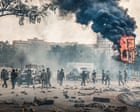
This past week witnessed a series of notable events across different parts of the globe, each telling a unique story of struggle, resilience, and progress. In Africa, nations grappled with both political unrest and the enduring scars of past conflicts, while internationally, judicial decisions and social justice gained the spotlight.
In Kenya, the nation marked the first anniversary of the significant storming of parliament by protesters with nationwide marches. These demonstrations, conducted on June 25, 2024, honored those lost in last year’s anti-government protests. The anniversary, observed by rights activists, families of those affected, and the youth, was termed by opposition leaders as a “people’s public holiday.” Despite fears of unrest, these marches symbolized a unifying moment of remembrance and hope for many Kenyans. However, the presence of law enforcement, equipped with water cannons and tear gas, underscored the ongoing tension between citizens and the government.
Meanwhile, in Zambia, a different set of emotions unfolded as legal complexities briefly paused the funeral of former President Edgar Lungu. Mourners, gathered in Johannesburg, faced unexpected delays when a high court judge ordered a halt to the burial proceedings at the Cathedral of Christ the King. This decision, prompted by a request from Zambia’s attorney general, highlights the enduring political tensions and disputes extending beyond Lungu’s tenure, further illustrating the intricate nature of political legacies.
In contrast, Sudan’s reality appears more harrowing against the backdrop of its civil conflicts. An attack on the Al-Mujlad hospital in West Kordofan tragically claimed over 40 lives, including health workers and children. This attack, condemned by the World Health Organization, underscores the dire humanitarian situation resulting from Sudan’s prolonged internal strife. With no clear assignment of blame, the attack emphasizes the fragile environment in which civilians and aid organizations operate.
The week also saw significant legal developments in the United States with implications on immigration and human rights. Jordin Melgar-Salmeron, wrongfully deported to El Salvador, received a ruling for his return to the U.S. by an appeals court. This judicial decision challenges the Trump administration’s compliance with legal orders and accentuates the complexities surrounding immigration policies and the demanding task of ensuring justice and due process.
Concurrently, in sports and social justice, Spain witnessed a reaffirmation of accountability in the case against Luis Rubiales, the former president of the Spanish football federation. His conviction for forcibly kissing player Jenni Hermoso was upheld, with the court labeling the actions as “sexual assault” and imposing a fine. This verdict reinforces ongoing global conversations on consent and respectful conduct irrespective of status or power.
These events, spanning diverse regions and topics, collectively depict a world grappling with its past as it ventures into unforeseen futures. The inherent challenges call for collaborative efforts, understanding, and unwavering optimism in the pursuit of peace, justice, and healing. As situations develop, these stories serve as gentle reminders of resilience and the continuous journey toward positive progress.
Source: {link}
